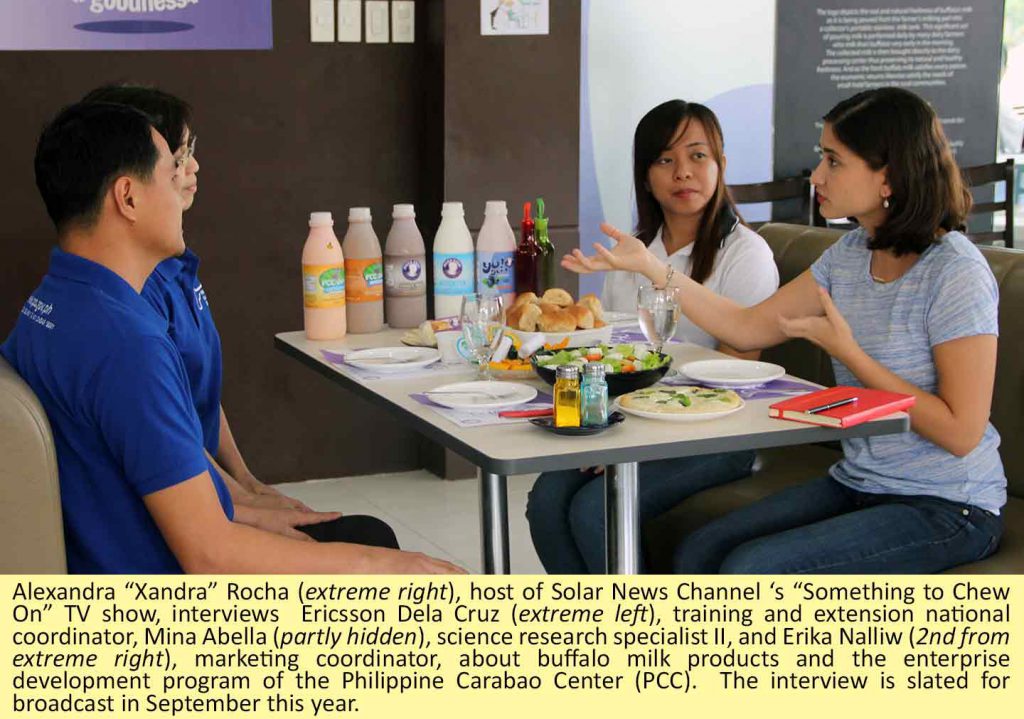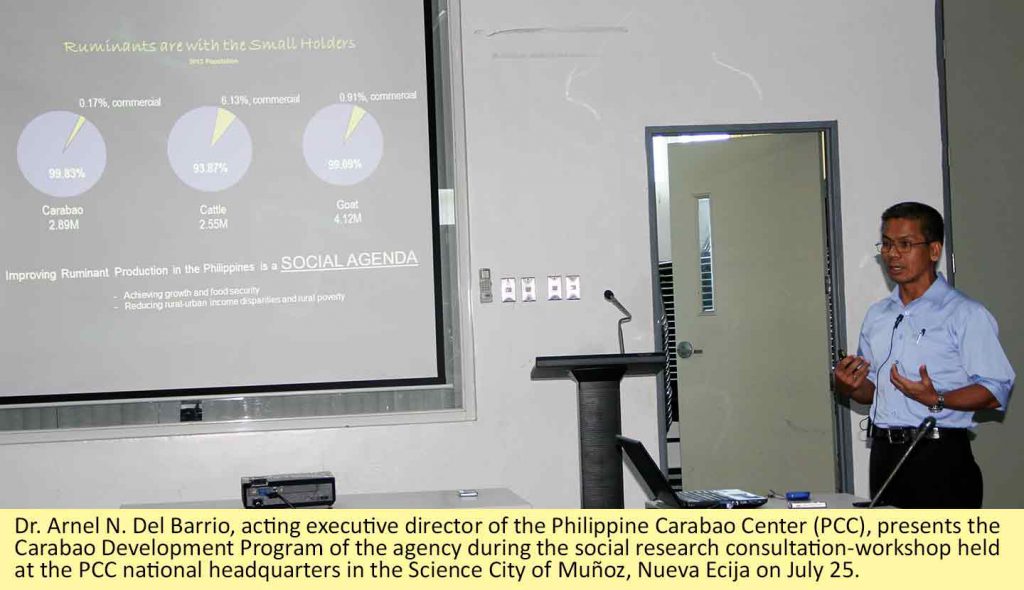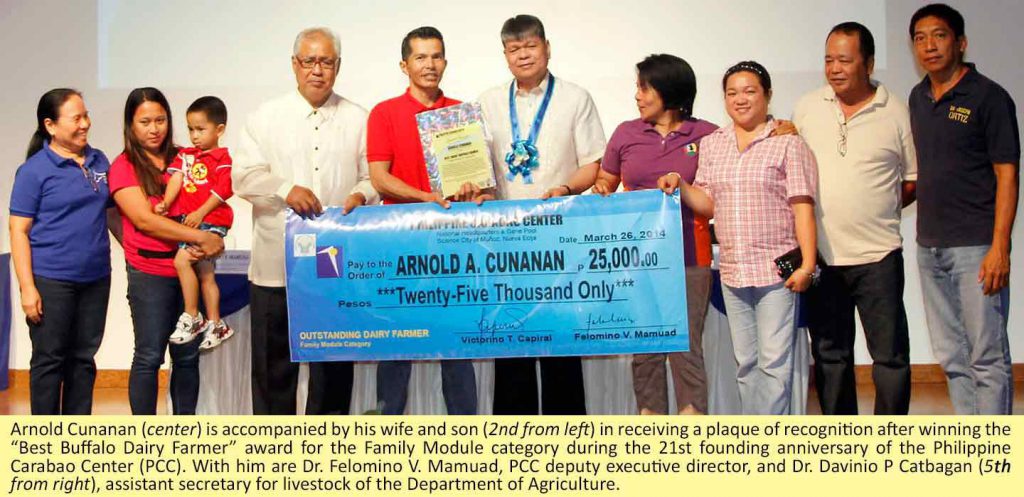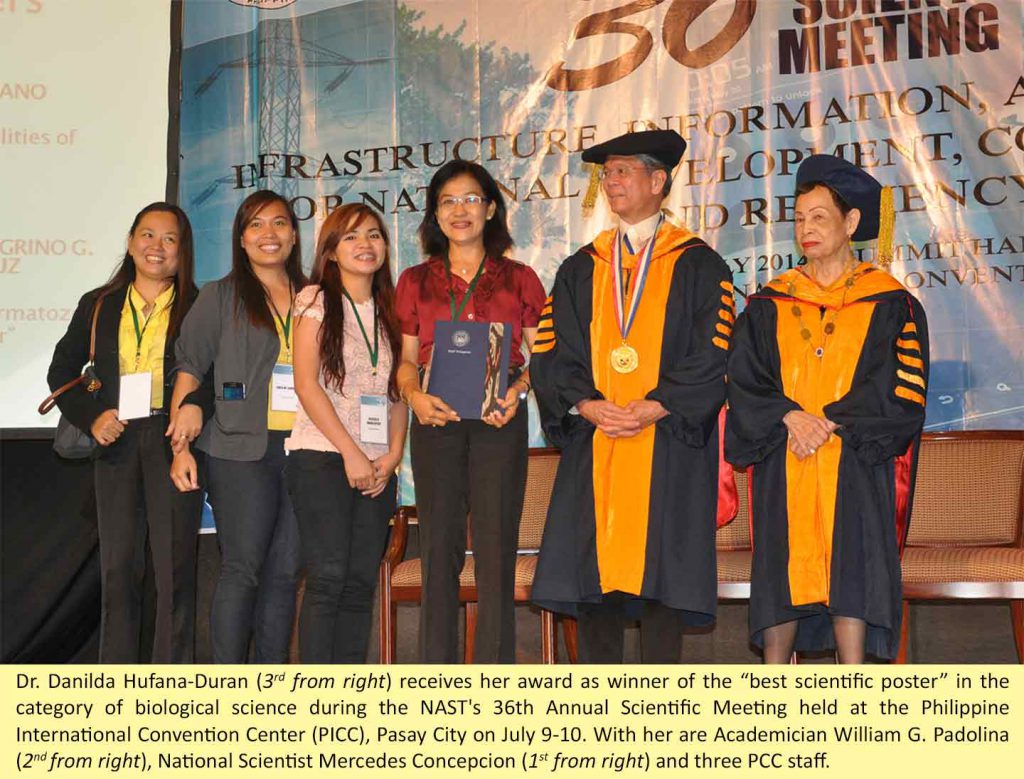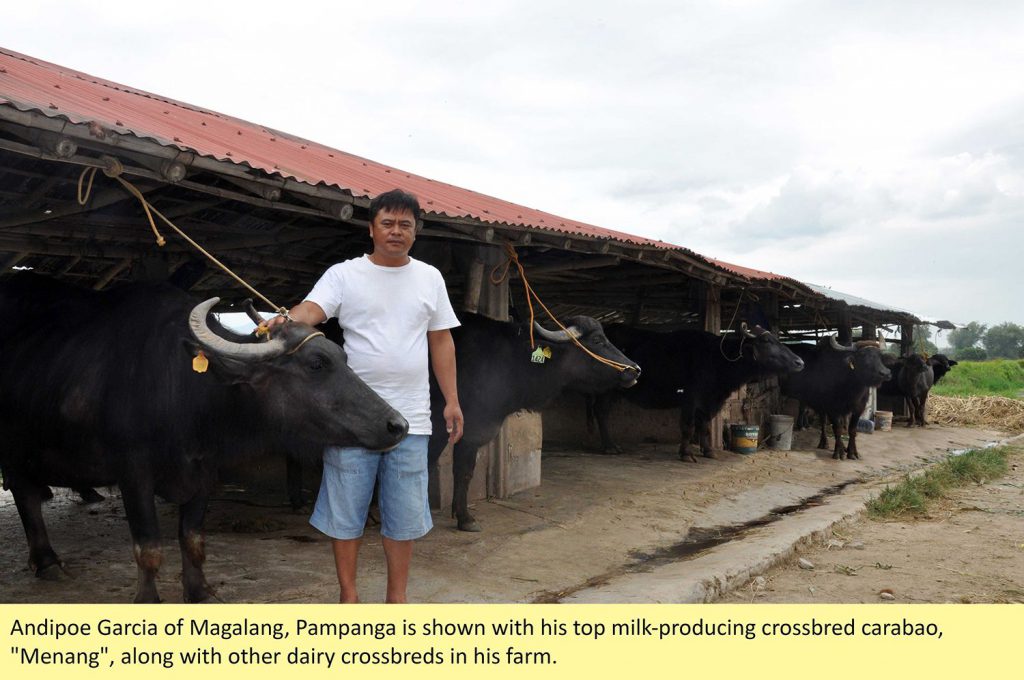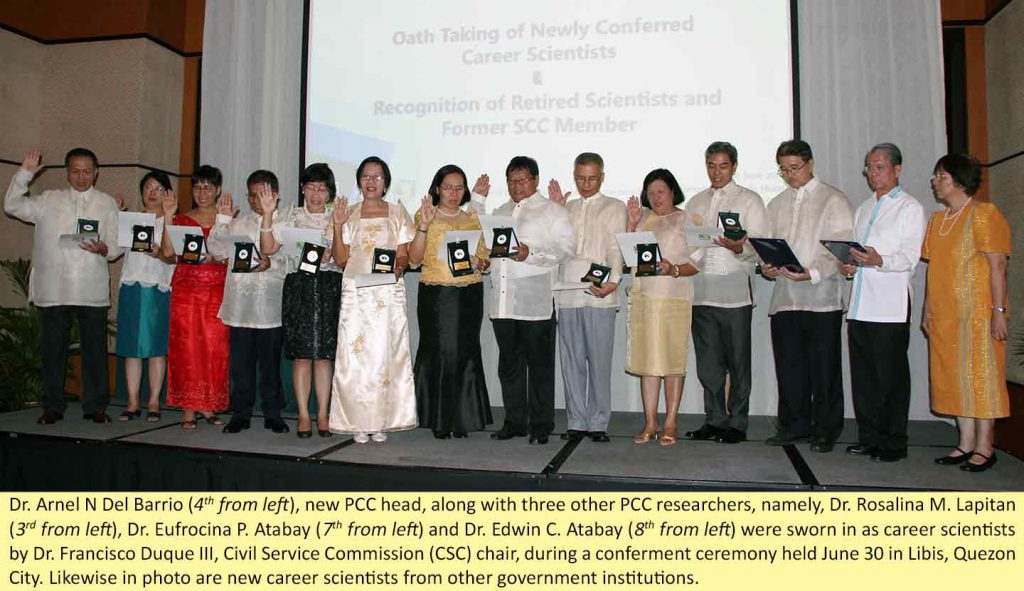Month: July 2014
PCC holds social research consultation-workshop
Social science experts from three universities participated in a consultation-workshop held on July 25 at the national headquarters of the Philippine Carabao Center (PCC) in the Science City of Muñoz, Nueva Ecija.
The workshop focused on possible research collaboration regarding the social aspect of the PCC’s carabao-based enterprise development (CBED) program.
The participating experts came from the University of the Philippines-Clark, University of the East, and University of the Philippines-Diliman.
Also present were Dr. Arnel N. del Barrio, acting executive director of PCC; Dr. Libertado C. Cruz, former PCC head; and the agency’s top officers and researchers.
According to Dr. Liza G. Battad, PCC planning officer, the workshop sought to generate stronger participation among the agency’s partners in the academe in the conduct of social researches.
She said the envisioned collaborative studies will provide “a better understanding of persistent social issues and program level requirements that will hasten the up-scaling of the CBED component of the Carabao Development Program (CDP) of the agency.”
During the consultation, Dr. Arnel Del Barrio, PCC acting executive director, presented the agency’s Carabao Development Program (CDP), particularly how the program is being implemented.
On the other hand, Dr. Eric Palacpac, PCC Research for Development (R4D) national coordinator, discussed the R4D framework of the agency, specifically the research priority areas.
Following the presentations, an open forum ensued where issues concerning the different aspects of CBED that may be addressed by social research were raised.
At the end of the meeting, Dr. Battad presented a list of research topics based on the R4D priority agenda that were deliberated upon for possible collaboration.
From pigs to carabaos: The shift that pays
A thunderous applause met him as he made his way to the stage. A mix of emotions assaulted him, but happiness stood out. Why not when one of his dreams has just been realized?
On that particular day, March 27, 2014, Arnold Cunanan, 38, received a plaque of recognition for being “Outstanding Dairy Buffalo Farmer” for the Family Module category during the celebration of the 21st founding anniversary of the Philippine Carabao Center (PCC).
This is one of the awards annually given by the PCC to selected dairy farmers who have excelled in carabao-raising during the agency’s anniversary every March.
For two years, the award has been elusive to Arnold, who always placed runner-up during the selection process. On the third try though, his efforts finally paid off.
“I wanted to shout for joy because I have been hoping to win this award for so long,” Arnold said. His wife, Angelita, 35, and one of their two kids accompanied him in receiving the honor.
Arnold, who used to have a piggery, became interested in dairying because of the encouragement from his friend, Allan Benitez, the current chairman of Simula ng Panibagong Bukas Producers Cooperative (SIPBUPCO) in their place in Porais, San Jose City, Nueva Ecija.
“He was always telling me that carabaos can be of great help to a family especially when they are already producing milk,” he stated. Although he already had a native carabao and a crossbred, he only used them as draft animals.
Arnold joined SIPBUPCO in 2009 and was grateful that he was one of those who were loaned with Brazilian Murrah buffaloes under the 25-dairy cow module of the PCC in the same year.
As a start, he converted his piggery into a corral for his carabaos. He also planted a portion of his farm with napier grass.
Although it was only in 2011 that some of Arnold’s animals started getting pregnant, he did not lose hope. He planted his farm with onions and rice during the dry and wet seasons, respectively, as he patiently raised his buffalo herd.
“I was very determined to get my herd impregnated and milk them,” Arnold said.
After subjecting his animals to artificial insemination or to natural mating with bulls in the morning, he would repeat the whole process in the afternoon to ensure that they would get pregnant. He also made sure that they were not subjected to extreme heat in the pasture area. Further, he administered vaccines and vitamins to his herd when needed.
He provided his buffaloes with enough sustenance, such as napier grass and rice bran. When his supplies were scarce, he would buy sakate (forage) worth Php20 per bundle from the neighboring village.
Milk started flowing from his carabaos that gave birth in 2012. He would collect about four liters from each of his lactating animals. He would then sell the milk produce at PhP50 per liter to the Nueva Ecija Federation of Dairy Carabao Cooperatives (NEFEDCCO), the processing and marketing arm of the PCC-assisted dairy cooperatives in Nueva Ecija.
To ensure the quality of his milk, Arnold regularly attended the PCC-supervised monthly milk test day conducted by their cooperative.
“Participating in the milk test is time-consuming but through this activity, I would know if my buffaloes are suffering any diseases so I would be able to administer the right veterinary medicine. I would also know if the milk is safe for consumption,” he explained.
Through all of these, Arnold has his family to count on. His wife and kids would deliver the milk to the collection center of their cooperative. They also help in cleaning the stall housing the carabaos and in feeding them.
“Our life is now more comfortable. We no longer run out of money for food and we already have enough for our daily expenses,” Angelita, Arnold’s wife, happily shared.
Since their income from milk sales is enough to cover their daily needs, they were able to save what they earn from selling onions. They were also able to transfer their first child to a private school because they could already afford it.
After being awarded as an outstanding dairy buffalo farmer, Arnold was all the more encouraged to further improve his dairy business and expand the number of his herd. Now, he has 15 dairy buffaloes, two of which are already lactating while seven are these are pregnant.
He said he is more than willing to share his knowledge and experiences in buffalo dairying with his fellow dairy farmers who seek his advice.
“I always tell them to maintain the body of their buffaloes and stay alert for the start of the estrous cycle. If the body score is very low or very high, it will be difficult to get the animals pregnant,” Arnold revealed
“The ideal body score is from 3 to 4.5. This was taught by the PCC and I have personally observed it to be effective,” he added.
It is also important, he said, to keep proper records of the vital data about the buffaloes.
“Above all, a dairy farmer needs to be industrious and diligent,” he emphasized.
He is now improving and expanding the housing for his buffaloes using the cash prize he received from PCC as part of his award. He also has set his sights on increasing his herd, like another dairy farmer whom he looks up to, Marcelino Mislang, one of the highly successful dairy farmers in San Jose.
With the hard work and determination, Arnold Cunanan is well on his way toward attaining greater success.
PCC scientific poster wins NAST award
The Philippine Carabao Center (PCC) research study titled “Motility Characteristics of Ejaculated Bovine Spermatozoa in L-Carnitine Supplemented Tris Egg Yolk Extender” was adjudged the “best scientific poster” by the National Academy of Science and Technology (NAST) during its 36th Annual Scientific Meeting (ASM) held at the Philippine International Convention Center (PICC), Pasay City on July 9-10.
Dr. Danilda Hufana-Duran, scientist and researcher at the agency’s reproductive unit, led the team that conducted the study, which sought to examine the effect of L-Carnitine supplementation in Tris Egg Yolk extender in improving the motility characteristics of bovine spermatozoa.
The participating team members included Dr. Libertado C. Cruz and Dr. Peregrino G. Duran, both from PCC, as well as two scientists from abroad, Dr. Rick Monson and Dr. John Parish.
The 36th ASM focused on the theme: “Infrastructure, Information and Innovation (I3) for the National Development, Competitiveness and Resiliency of the Philippines.
Organized by the NAST, the event highlighted the three pillars of competitiveness as defined by the World Economic Forum (WEF).
Started in 1978, the annual activity of the NAST has earned the distinction of being the most prestigious Philippine scientific conference that serves as the leading forum for the presentation of scientific and policy researches. Policy recommendations on appropriate interventions arising from the ASM are then submitted to the Philippine government and the private sector.
The other highlights in the conference were the presentation of scientific papers and posters; handing of awards for the best scientific poster, outstanding scientific papers and books/monographs; and conferment of awards and recognition to the NAST Environmental Science awardee, NAST Talent Search for Young Scientists, The World Academy of Sciences (TWAS) Prize for Young Scientists in the Philippines and Outstanding Young Scientists.
The installation and oath-taking of new academicians were also held during the awarding ceremonies. Department of Science and Technology DOST) Secretary Mario G. Montejo and Academician William G. Padolina, president of NAST Philippines, led the rites.
The 36th ASM also featured plenary sessions and a scientific exhibition participated by various government agencies and institutions implementing a biotechnology program and pharmaceutical companies and other private firms promoting their biotech products.
The PCC was one of the major sponsors and exhibitors. The agency highlighted in its display the role of research for development through livestock biotechnology in promoting its mandated program to the target clienteles.
Magalang farmer’s ‘Menang’ yields as much as 14 liters of milk daily
Andipoe Garcia’s fondness for his crossbred dairy carabaos is unmistakable: Each animal in his herd has a name.
And among the animals, he is proudest of “Menang”, which produces as much as 14 liters of milk a day for three months. In her other months of lactation, she gives seven to eight liters a day.
“I also have ‘Marisa’, ‘Bilyang’, ‘Elyang’ and 18 others more like them, but they can’t beat my “Menang” in milk production,” Garcia, who hails from Sitio Mapiña, Barangay San Ildefonso, Magalang, Pampanga, hastens to add.
His dairy animals are products of the crossbreeding of the native carabaos and the dairy-type, which is either the Murrah or Brazilian breed.
All told, Andipoe daily harvest amounts to an average of 56 liters of carabao fresh milk. He delivers the produce to the Angeles City-based Sussie’s, which specializes in food products wherein milk is an important ingredient. He sells the milk at P80 per liter.
An undergraduate, but honed in his younger years in the skills of raising native carabaos owned by his father, he was encouraged by Federico Libo, his brother-in-law, to enroll his carabao in the government’s crossbreeding program that utilizes the artificial insemination (AI) technique. In time, his carabao gave birth to crossbred calves which he describes as “dark in color and decidedly bigger than the native calves”.
When his crossbreds became mother carabaos, he started milking them. He sold his milk produce at P30 per “lapad” (rum bottle).
Among his crossbreds, he is very proud of “Menang”, now 12 years old, because of her milk performance. Compared to the native carabao’s yield of only about 1.5 liters of milk daily, crossbreds produce a lot more, resulting in higher daily income for the dairy carabao farmer.
Aside from the milk harvest, Andipoe also earns additional income from the sale of male calves. The yearlings are sold at some P18,000 each.
Andipoe credits his brother-in-law Federico for his entry into the field of dairy carabao farming. In their community, it was Federico who was the first to respond to the government’s call for the upgrading of the native carabaos through artificial insemination. He convinced Andipoe to follow suit. The rest, like they say, is history.
Currently, Andipoe has a herd of 34, some of which he has entrusted to a number of fellow farmers under a “paiwi” scheme in which he will be repaid in kind.
Associations established
The brothers-in-law have also made sure that their achievements in raising dairy carabaos and dairying would also be of help to the other farmers in their area. In 2009, they initiated the formation of the Mapiña Carabao Owners Association (MCOA).
The MCOA, which is headed by Andipoe, is composed of 25 farmer-members whose total animal holding comprise some 350 crossbreds.
The association collects a total of 100 to 150 liters of milk a day. Most of the produce is processed by members of the Mapiña Panol ng Kabuhayan (MPK), which is composed of the wives of the MCOA farmer-members. Processing is done at MCOA’s newly-established processing plant-cum-office and outlet.
LGU-PCC tie-up
The local government unit of Magalang and the Philippine Carabao Center at Central Luzon State University (PCC at CLSU) collaborates in ensuring the smooth implementation of the carabao upgrading program in Sitio Mapiña. The help of other entities, who also believe in the program, has likewise contributed to the success of the farmers in the program in this Magalang sub-village.
“The MCOA is our town’s model association in Magalang,” Milagros D. Suing, the town’s Municipal Agricultural Officer (MAO), said. “We always point out to our farmers who want to go into dairying to emulate what the officers and members of MCOA did in embracing the program,” she added.
“The MCOA is also proving to be our showcase of a well-implemented Carabao Development Program (CDP) in the whole of Pampanga,” Suing further said.
The dedicated service of the two technicians in the Magalang agricultural office and the wholehearted support of Magalang Mayor Romy Pecson in the program are also huge factors in helping the farmers of Sitio Mapiña in their achievements under the CDP.
“We never tire of going to Mapiña to extend our services,” said Crisanto G. Muñoz, AI technician.
“We personally extend our services to them, even using our personal money to visit the place and going house-to-house to deliver AI services to the breedable carabaos,” he added.
He said Mayor Pecson has allotted an annual budget of Php200,000 for the needed supplies and materials.
Muñoz also said that they acquired much of their knowledge and skills in the practical application of the technologies through the trainings and seminars provided by the PCC at CLSU.
He also pinpoints the achievements of Mapiña as the best example of a successful crossbreeding program and its now emerging enterprise being run by the women-folk in that area.
“We are pushing Mapiña as our ‘crossbred carabao capital’ in the sub-village level,” Muñoz said.
Piece of advice
Given his experience as a progressive crossbred carabao raiser, Andipoe Garcia shared his advice to farmers aspiring to succeed in dairying. He said that dedication and hard work are vital for this kind of endeavor.
“It is important that you love what you are doing and it should be with all your heart,” he added.
4 PCC researchers conferred Scientist I rank
Another four researchers from the Philippine Carabao Center (PCC) have been conferred the rank of Scientist I under the Scientific Career System (SCS) by the Department of Science and Technology (DOST) and the Civil Service Commission (CSC) effective March 5, 2014.
This brings to seven the current number of career scientists at PCC, which is an attached agency of the Department of Agriculture (DA).
The new career scientists are Dr. Arnel N. del Barrio, Dr. Edwin C. Atabay, Dr. Eufrocina P. Atabay and Dr. Rosalina M. Lapitan. They were granted the Scientist I rank by the Scientific Career Council (SCC), which is the governing body of the SCS.
They took their oaths during a ceremony held on June 30 at Eastwood Richmonde Hotel, Quezon City, with Dr. Francisco T. Duque III, CSC chairman, and Fortunato T. Dela Peña, DOST undersecretary, as administering officials.
The SCS is “a system of recruitment, career progression, recognition and reward of scientists in the public service as a means of developing a pool of highly qualified and productive scientific personnel.” The SCS program is currently being administered by the National Academy of Science and Technology (NAST).
“Indeed, Filipino scientists have a lot to offer to this country, but as career scientist, the nature of your work is special because you are wearing two hats. You are not only a champion of science but at the same time a public servant. Your published works, experiments, and researches are not intended to benefit some corporations or private entity but must have a direct positive impact of the public resource. Public service is the fitting career to make a difference in people’s lives,” Chairman Duque emphasized in his message.
“I believe that as public servants, the best reward and recognition we can get despite the work we do is the expression of gratitude and satisfaction from the people we serve. Thus, we should always aim for excellence and transition for being a Lingkod Bayan to a worthy Lingkod Bayani,” he added.
The significant contributions and professional expertise in research and development of the four PCC researchers made them qualified and eligible to the rank of Scientist I.
Dr. A.N. Del Barrio, who has been appointed as acting PCC executive director, is an animal nutritionist and a productive researcher in his field of specialization and disciplines. In 2000, the NAST bestowed on him an Outstanding Young Scientist award. His contributions include a better understanding of the rumen function, determination of nutritive values of different feed ingredients, development of appropriate feed supplementation strategies and formulation of practical feeding systems for small-holder and commercial production of buffaloes. His researches on determining the potential of buffalo for milk and meat production also generated a substantial number of technologies and information for the buffalo industry. He is also recognized for modeling dairy buffalo-based enterprises and promoting buffalo as input to a profitable social enterprise for farmers.
Dr. E.C. Atabay, who is center director of PCC at Central Luzon State University (CLSU), contributed significantly to the development of somatic cell nuclear transfer procedure in buffalo and produced clone embryos for embryo transfer and cryobanking. His contributions likewise to improving the efficiency of other important reproductive technologies, such as artificial insemination, multiple ovulation and embryo transfer, in-vitro embryo production and transfer, and cryopreservation of oocytes and embryos of buffalo, cattle and goat for genetic improvement in livestock, are well documented.
Dr. E.P. Atabay contributed significantly in establishing the current in vitro reproductive techniques, such as in vitro production of buffalo, cattle and goat embryos, and the cryopreservation of oocytes, embryos, somatic cells, and semen for reproduction and cryobanking purposes. She also took the lead in R&D for optimizing other reproductive biotechnologies, such as ovulation and estrus synchronization, fixed time artificial insemination, multiple ovulation and embryo transfer, through better understanding of the ovarian function and follicular dynamics, and to enhance the efficiency of assisted-reproductive technologies in livestock production.
Dr. R.M.Lapitan is an active and prolific researcher as shown in a number of local and international researches in which she was the senior author and/or co-author. She has been a supervising science research specialist of PCC at UPLB since 1996. She is an animal nutritionist by profession but also specializes in milk and meat processing. She contributed to the development of appropriate feed supplementation strategies that increased the feeding value of crop residues, resulting in improved growth and productivity of buffaloes. She established appropriate fattening technologies for crossbreds and pioneered the development of high-end gourmet sausages from carabeef which creates industry breakthrough. She is also an extentionist, translating her researches into technologies and extending them to PCC target partners: technicians and farmers.
Under the SCS, career scientists are entitled to automatic increase in salary grade corresponding to the rank, benefits and entitlements under the R.A. 8439 or the “Magna Carta for Scientists, Engineers, Researchers and Other Science and Technology Personnel in Government”.
Furthermore, their performance and productivity are evaluated yearly and their standing is used as basis for awarding additional incentives and grants.
The three other PCC researchers earlier conferred the rank of Scientist I were Dr. Claro N. Mingala, Dr. Danilda H. Duran and Dr. Peregrino G. Duran.

